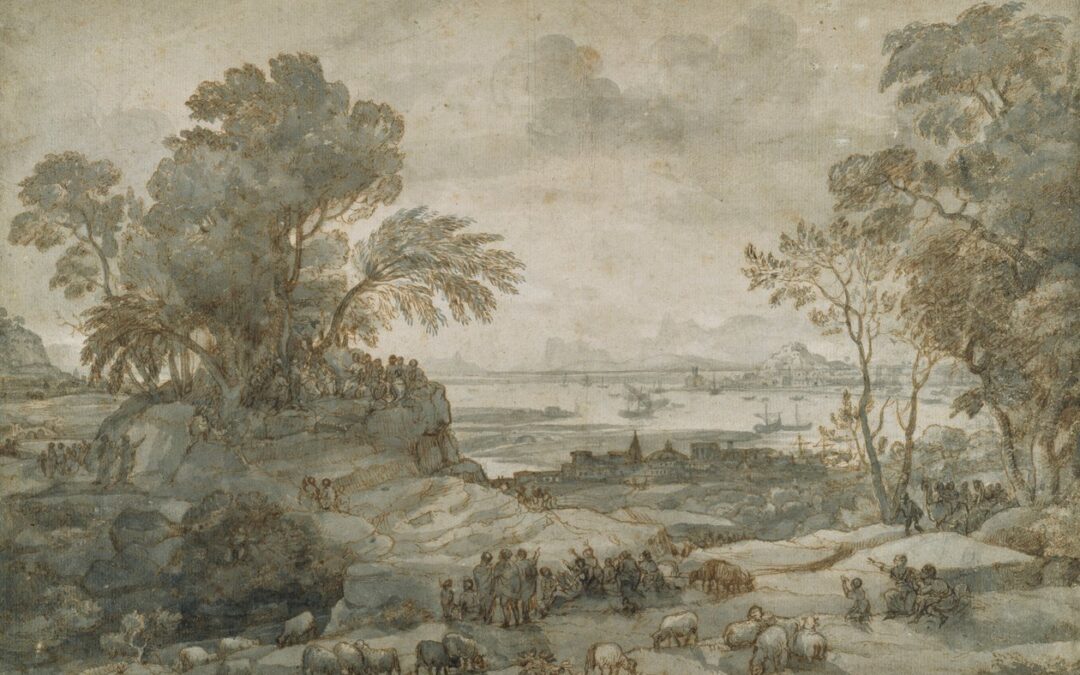Then Herod, when he saw that he was deceived by the wise men, was exceedingly angry; and he sent forth and put to death all the male children who were in Bethlehem and in all its districts, from two years old and under, according to the time which he had determined from the wise men. Then was fulfilled what was spoken by Jeremiah the prophet, saying: “A voice was heard in Ramah, Lamentation, weeping, and great mourning, Rachel weeping for her children, Refusing to be comforted, Because they are no more.”
Matthew 2:16-18
Herod the Great suffered no rivals, no threats to his power. Furious at being tricked by the Magi, he sent soldiers to kill all the infant and toddler boys in Bethlehem. Matthew reflects on this evil, pointing to God’s sovereign hand in prophetic fulfillment. It is understandable that readers have many questions after reading Matthew’s interpretation. What are we to make of this fulfillment formula? This is Bethlehem, not Ramah. These bereaved parents are not “Rachel,” Jacob’s favorite wife. How are we to see any Christological fulfillment in this? What does this have to do with Jesus of Nazareth being the King Who brings in the Kingdom of Heaven? Was not He born of Judah, son of Leah? What does Rachel and her sons Joseph and Benjamin have to do with this massacre? How does this fulfillment inform Matthew’s readers of Jesus’ identity, preparing them for the Sermon on the Mount?
Jeremiah’s prophecy is quoted and declared fulfilled in Bethlehem’s mourning for her dead children. Interestingly this prophecy occurs in a chapter full of comforts and hopeful promises. “Thus says the LORD: “A voice was heard in Ramah, Lamentation and bitter weeping, Rachel weeping for her children, Refusing to be comforted for her children, Because they are no more”” (Jeremiah 31:15). This verse is a counterpoint to the first fourteen verses offering consolation to Ephraim. Ephraim’s need for comfort is part of the scenery here in the first section of this chapter (Jeremiah 31:2, 4, 8, 9, 10, 13). But it is the voice heard in Ramah that causes us to actually stop. We are halted by the haunting; compelled to consider the depths of grief. We are stopped in Ramah, a city of Benjamin (Joshua 18:20, 25) and famous Ephraimites (1 Samuel 1:19; 25:1), eleven miles north of Bethlehem. The road between them contains an historical marker. “Then they journeyed from Bethel. And when there was but a little distance to go to Ephrath, Rachel labored in childbirth, and she had hard labor. Now it came to pass, when she was in hard labor, that the midwife said to her, “Do not fear; you will have this son also.” And so it was, as her soul was departing (for she died), that she called his name Ben-Oni; but his father called him Benjamin. So Rachel died and was buried on the way to Ephrath (that is, Bethlehem). And Jacob set a pillar on her grave, which is the pillar of Rachel’s grave to this day” (Genesis 35:16-20). What a sad note to Jacob’s return to Bethel and to the Promised Land! Rachel, dying in her grief, names her second born son, “Ben-Oni,” which translated means, “Son of my sorrow.” Jacob changes this to “Benjamin” meaning “Son of my right hand.” This thematic twist from sorrow to favor, from curse to blessing, is woven throughout Scripture in all its deepest threads.
Rachel, as a pathetic figure, casts a tragic shadow. By the days of Jeremiah the northern Kingdom of Israel, often called “Ephraim,” had been overrun and her people exiled by the Assyrians (2 Kings 17:18, 22-23). Rachel is the mother of Joseph and Benjamin (Genesis 35:24). Joseph, as Jacob’s firstborn son of his favorite wife, received a double inheritance—two tribes (Genesis 48:5-7). Of Joseph’s two sons, Ephraim was the greater over Manasseh (Genesis 48:8-20). Ephraim, Manasseh and Benjamin are all closely aligned with the Northern Kingdom now destroyed (Psalm 80:1-3). Thus, Rachel is bitterly mourning for her children, hostile to all comfort, for they are no more. Jeremiah’s following comforts and promises overcome Rachel’s resistance, however. God promises a return of her children (Jeremiah 31:17) by way of a “new thing” (Jeremiah 31:22). There will be a reunification of God’s people (Jeremiah 31:27) in an everlasting new covenant (Jeremiah 31:31, 36) built on better promises (Jeremiah 31:29-30, 32-34) featuring a far greater city (Jeremiah 31:38-40). A “Remnant” survived from the slaughter, was whisked away to Egypt (Matthew 2:15). His return will be as a shoot growing out of a stump (Matthew 2:23).
Matthew shows that Jeremiah’s prophecy is fulfilled by correlating both sorrow and comfort. Rachel weeps for her children, as well she should. They are destroyed as part of God’s judgment upon Israel for covenant transgressions (Deuteronomy 28:32; Hosea 13:16). That Herod, an Edomite and avowed enemy, holds dominion over the Jews and kills their infants at will must be understood biblically. This is a sign of God’s judgment upon covenant transgressors. The children suffer for the sins of their parents in the Old Covenant (Exodus 34:7; 2 Kings 24:1-3; Jeremiah 31:29). What comfort can there possibly be? Given the context of other multiple fulfillments in Matthew’s opening four chapters, the comfort for Rachel and for the bereaved parents of Bethlehem is a New Covenant, brought about by the Messiah. The New Covenant sets forth the hope of Messiah. He springs forth from the stump of Jesse, bringing reconciliation, redemption and resurrection. He brings an end to the curse, to sin and death. He wipes away the tears in His victory (Revelation 21:1-4). This is the comfort promised in Jeremiah (Jeremiah 31:34; 33:14-26), and the consolation offered in Matthew (Matthew 5:3-10). The beatitudes are for Bethlehemites too. Rachel may be comforted regarding her son of sorrow by looking to the Son of the Right Hand.
The Sermon on the Mount: The Man—Part 5, “The Nazarene”

